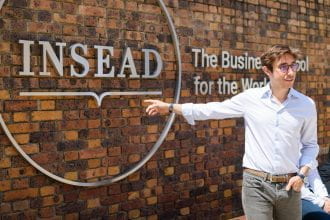
Wenke B. Thoman MBA’77, Vice President and Managing Director, Industrial Mineral Holdings, reflects on breaking gender stereotypes on Wall Street.
Q. What prompted you to pursue a degree at INSEAD?
My husband and I moved to Paris in 1976. He was at McKinsey & Company, and I was working for a financial firm called EF Hutton. Somebody suggested I should go to INSEAD, which had great appeal. I had not completed my undergraduate degree, but I applied anyway because I had a very successful career on Wall Street. During my INSEAD interview, they asked why I wanted to come to business school. I said, “I want to fill in the blanks. Having the opportunity to get a business degree would be a feather in my cap.”
Q. How did your INSEAD experience transform you?
My life at INSEAD was particularly meaningful for me. I was a student again, and I loved every minute. I was hell bent on doing well, which I did. It was a remarkable experience. It fulfilled my ambition to get this degree. Afterwards, I went back to Wall Street, but I became an investment banker, so it transformed me in many ways. It gave me skills that I didn’t have.
Q. What challenges have you overcome in your career?
It was challenging to juggle two children and a very demanding career. Investment banking has long hours and quite a bit of travel, but I managed. I had very good professional help and an outstanding husband. The other challenge was that I would very often be the only female on the team. It wasn’t something that I was particularly conscious of at the time, but I am now, in retrospect. I remember for some clients, it was the first time they’d ever professionally worked with a woman. They would say it, never in a derogatory way, but there was certainly an element of surprise that they were working with a female executive.
Q. Has your career or life evolved as you expected?
Not completely. In the late `80s I got a divorce, which was unexpected. But I was determined to live my life as I had before and make sure my children had the same opportunities. I was fortunate in that I had an ex-husband who was supportive, and I was able to continue working. Through a series of good decisions, just as the financial crisis hit, I got out of the financial sector and started working full-time with my business partner, Philippe Delouvrier MBA’77. I had the best fortune in the world to work with him. We built a great company, Industrial Mineral Holdings, which was very successful, so it all turned out well.
Q. How have you made an impact in the world?
All my not-for-profit work is in the international student space to foster exchange opportunities. One is the MacJannet Foundation, which promotes international tolerance and cultural understanding via educational experiences; I helped create the MacJannet Prize to recognise community outreach and global citizenship. I’m also very proud of establishing the Judith Connelly Delouvrier Endowed Scholarship for women at INSEAD in 1997. It was the first endowed scholarship and gives out two each year. I’ve also been involved in One to World, an organisation in New York that provides enrichment programmes to international students.
Q. How do you use business as a force for good in your work?
I think that if you conduct your affairs properly, pay your workers and are a good steward of the environment, then by definition, you are using business as a force for good. Philippe and I did it in our company—we had about 500 people working for us, and we paid good wages and health insurance. It was a force for good in the community because it provided employment.
Q. What advice would you have for women at INSEAD who want to reach your level of success?
There is no magic bullet. You have to work hard, and you have to learn to get along with people. Being a team player is important, as is standing up for yourself. Lead by example, not by dictating. Being a good boss is being a persuasive boss and a good motivator.


